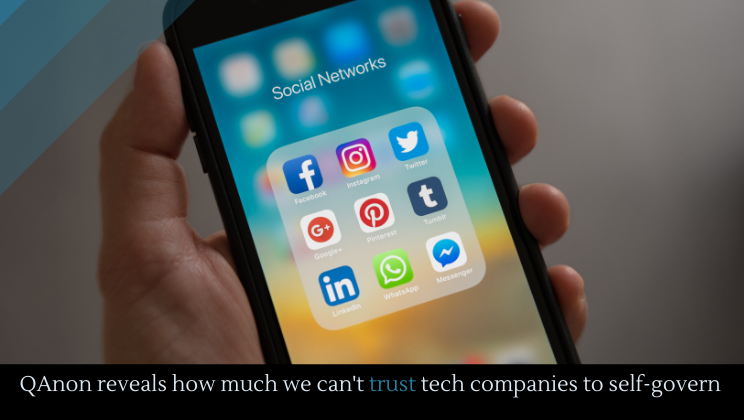QAnon reveals how much we can’t trust tech companies to self-govern
Posted by Thomas Bush / November 9, 2020
The success of the QAnon conspiracy theory forces us, as a society, to confront our relationship with big tech companies. Since their inception, sites like Facebook, Twitter, Amazon, and Etsy have made incredible amounts of money while taking zero responsibility for anything they host. By presenting themselves as simply a “marketplace,” they can plead innocence for whatever appears on their sites. And we’ve allowed that, partly because we’ve benefitted it from it. But now it’s time to reconsider or stance. QAnon shows us what kind of dangers accompany unregulated tech “market places.”
With Trump defeated, the are huge questions about what will happen to QAnon believers, the most rabid of his entire base. Some are left isolated from their families, and have to face the hard choice of returning to the fold and hearing the endless “I told you so” chorus. Others are doubling down, and they could get dangerous like the two armed Virginians were arrested in Philadelphia for trying to deliver fake ballots. They had QAnon paraphernalia in their car.
If you think QAnon conspiracy theory seems so toxic that it must have been intentionally created or amplified as a kind of Web 2.0 warfare against the United States, but didn’t have the evidence to back that up, well here you go. A recent Reuters article reveals that Russian-linked Twitter accounts helped the movement grow. Now, tech companies of all sort are trying to grapple with the conspiracy.
YouTube is banning all QAnon related content, as well as conspiracy content that targets individuals. With barely two weeks until the presidential election, will this be a case of “better late than never” or “a day late and a buck short?” Perhaps every little bit helps slow down the craziness, but will it be enough?
Facebook is also taking action to stop the spread of the QAnon conspiracy theory by banning it on the platform. Hopefully this means that QAnon won’t impact the election. NAACP president Derrick Johnson has called Facebook a “threat to democracy.” He is one of the leaders the ongoing Facebook boycott, and he also said the boycotters won’t quit until Facebook makes changes.
Twitter has banned 7,000 accounts related to the QAnon conspiracy theory, all of whom have violated the site’s policy on harassment. Twitter will also limit the spread of QAnon-related misinformation, which is expected to impact another 150,000 users. Unfortunately, QAnon conspiracists believe that big companies like Twitter are already part of a conspiracy against freedom, so this is basically guaranteed to go poorly.
More news.
Comments are off for this post.